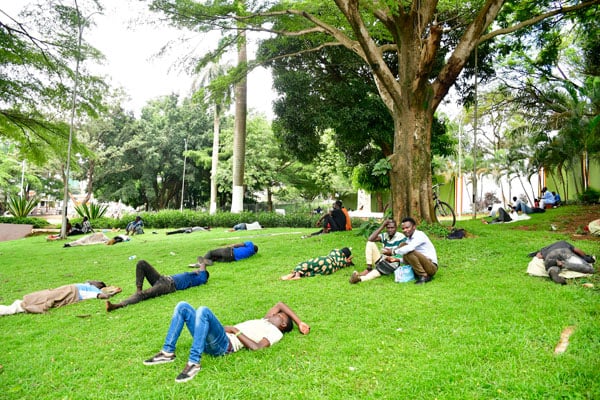Household spending to grow, report says

A person performs a transaction at a bank in Uganda. PHOTO/FILE
What you need to know:
- Inflation in Uganda has been consistently decelerating over recent months, from a peak of 10.4 percent in January 2023 to the 2.6 percentage points posted in December 2023.
A new report by a London-based financial information services company has revealed that spending activity in Uganda will continue strengthening in 2024.
The report by Fitch Solutions titled Uganda 2024 Consumer Outlook shows that there will be robust real household spending (at 2010 prices) growth in the country, representing a 6.3 percent year-on-year growth.
“This will take total household spending (at 2010 prices) from Shs63.8 trillion in 2023, to Shs67.9 trillion over 2024. Controlled levels of inflation will underpin stronger demand, as consumers begin to see improvements in purchasing power, driving accelerated growth in consumer spending,” the report shows.
It, however, shows that rising household disposable incomes, stronger private sector activity and accelerating economic growth will all provide tailwinds to this robust household spending.
The report’s forecast for robust growth in consumer spending in the country over 2024 is in line with forecasts for real economic growth to strengthen to 5.8 percent in 2024, up from 4.6 percent in 2023.
The development of Uganda’s oil sector continues to underpin investment growth, with projects such as the $10.0 billion Lake Albert Oil Project and the $4.0 billion East Africa Crude Oil Pipeline attracting significant investment inflows.
Meanwhile, private consumption will be supported by lower inflation and the pass-through effects of monetary easing. This follows the central bank’s decision last August to cut its policy rate by 50 basis points to 9.50 percent. This coupled with the expected further loosening of H224, an Act to amend and consolidate the Bank of Uganda Act for regulating the issuing of legal tender, maintaining external reserves, means the policy rate could be cut to 8.50 percent by year-end.
Lower inflation will also provide relief to real incomes, extending further support to household spending. In fact, the report reveals that private consumption is expected to grow by 6.4 percent in 2024, contributing 5.6 percentage points to real GDP growth.
Elsewhere, unemployment rates are to remain steady at 3.8 percent of the labour force over 2024. This will prop up consumer spending not least because the limited weakening of the shilling (from Shs3,690/$ in 2023 to Shs3,871/$ in 2024) will translate into a steady cost outlook for imported goods, providing further tailwinds to this outlook.
Inflation in Uganda has been consistently decelerating over recent months, from a peak of 10.4 percent in January 2023 to the 2.6 percentage points posted in December 2023.
Mr Cedric Chehab, the managing director of country risk at Fitch Solutions Company International, says controlled inflation will encourage both a greater impetus for the Bank of Uganda to cut rates, but also increase consumer activity.
“Our country risk team forecasts inflation to average 4.1 percent in 2024, before ending the period at 4.3 percent. This is in line with the pre-pandemic trends, between 2015 and 2019, where inflation averaged 3.8 percent,” he said.
According to Mr Chehab, this will boost business and consumer confidence as a sense of price stability returns. Furthermore, the easing of food inflation will be a key contributor to consumers both spending more on the segment and other categories.




